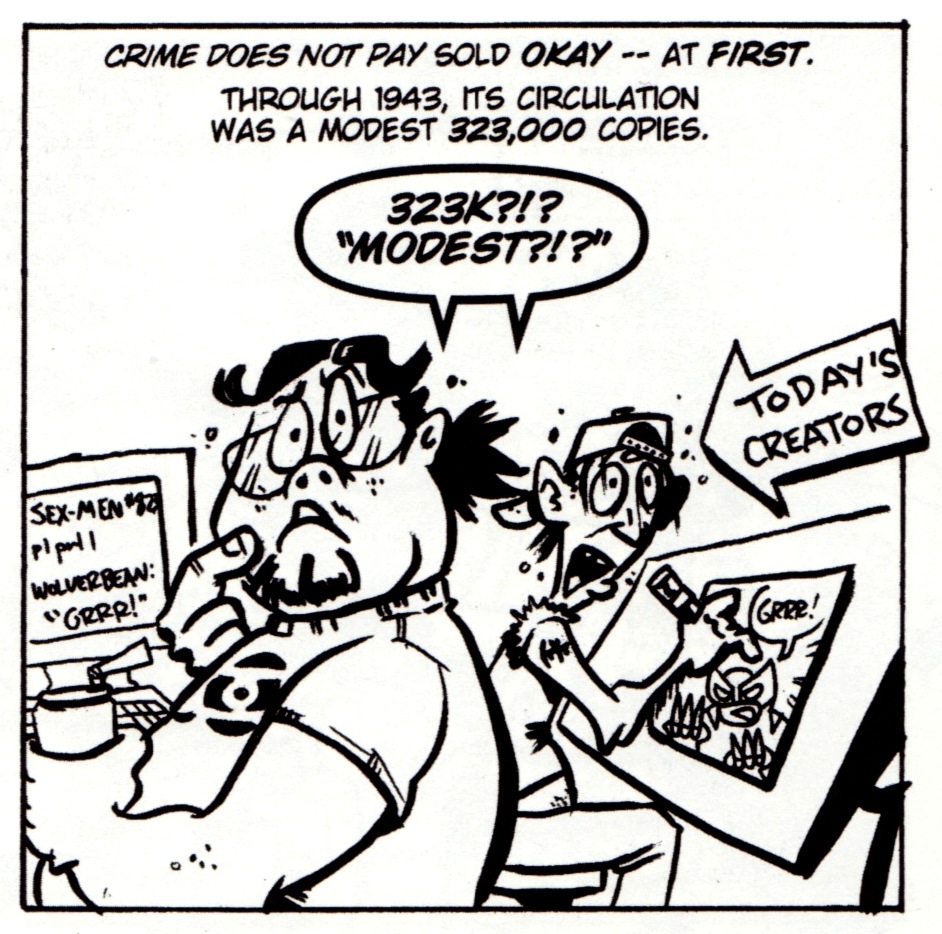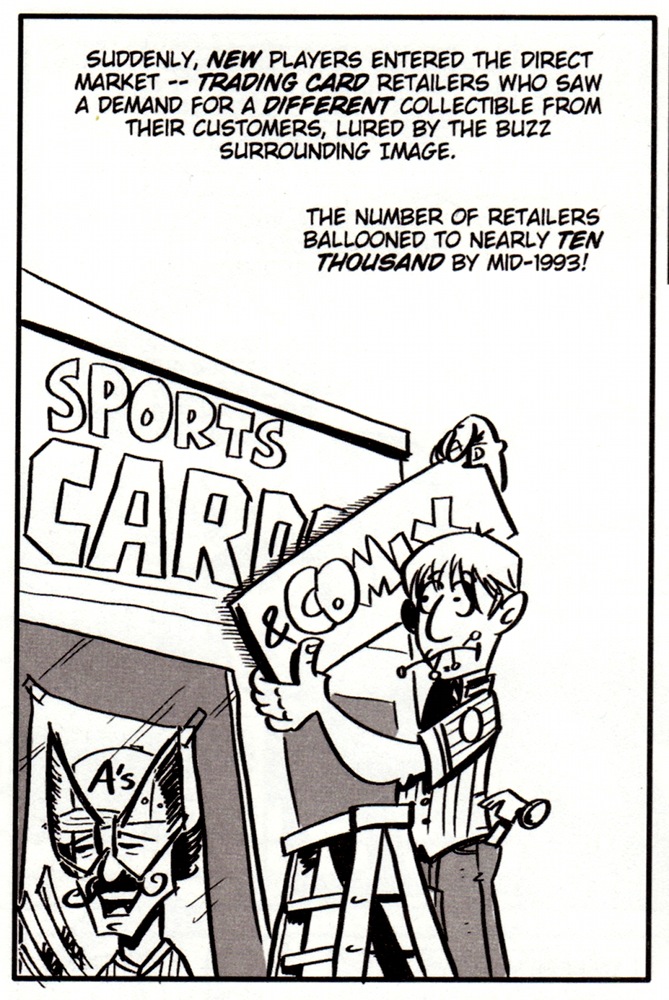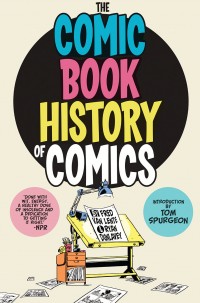Book of the Month
What did the
iFanboy
community think?
Pulls
Size: 224 pages
Price: 21.99
Before you figure out where you’re going it’s important to know where you’ve been.
In the business of comic books, history is not only revered but it’s the very lifeblood of the industry. The nostalgia that comes from memories of days gone by is what guides 70-80% of the market these days. But how many readers actually know the history of the business and of the people who spawned the characters and the books that they they love so much? How many know just how popular comic books once were and how close they have come to disappearing completely? How many are familiar with the bizarre and fascinating decades long journey that comic books have taken through history and popular culture to get where they are right now?
Enter: Fred Van Lente and Ryan Dunleavy and The Comic Book History of Comics.
Originally self-published in six issues as Comic Book Comics from 2008 to 2011, this collection, with a new more self-explanatory title, is brought to you by IDW Publishing and is about as comprehensive a story of the history of the comic book medium as you’re going to get in one volume.
It’s certainly the most fun and the most imaginative.
 This is no prose novel. Utilizing the form of comic books themselves, Van Lente and Dunleavy run the gamut of storytelling through the combination of words and pictures, starting with satirical engravings from the 1500s and ending with the digital comics revolution of the last few years. And in-between they cover everything from the comic book boom during World War II, to the rise of and fall of EC Comics, Marvel Comics in the 1960s, Dr. Frederic Wertham, R. Crumb and underground comix, manga, Franco-Belgian comics, the collapse of the newsstand and the rise of the direct market, and internet piracy. And that is but a small fraction of what’s found on these 200+ pages.
This is no prose novel. Utilizing the form of comic books themselves, Van Lente and Dunleavy run the gamut of storytelling through the combination of words and pictures, starting with satirical engravings from the 1500s and ending with the digital comics revolution of the last few years. And in-between they cover everything from the comic book boom during World War II, to the rise of and fall of EC Comics, Marvel Comics in the 1960s, Dr. Frederic Wertham, R. Crumb and underground comix, manga, Franco-Belgian comics, the collapse of the newsstand and the rise of the direct market, and internet piracy. And that is but a small fraction of what’s found on these 200+ pages.
The subject of comic books is so vast and sprawling that it could never hope to be completely covered, especially not in one regular sized volume. But Van Lente and Dunleavy do their darndest to lay out a mostly chronological trip through comic book history that hits on the important points while stopping to dwell in detail on the most important events. It’s a tremendous undertaking and I can’t imagine having to sift through decades of history to distill it down, deciding what deserves a couple of panels or just one page versus an entire segment or chapter.
The greatest strength of The Comic Book History of Comics is that the information presented on the page, which at times could be considered very dry, is done so in a very simple, straight forward, and easy to understand manner, helped along with a heavy dose of humor. Van Lente and Duleavy have a gift for distilling complex concepts like copyright law or work for hire contracts and relaying them to their audience in a clear, concise and entertaining manner.
There is so much good stuff in The Comic Book History of Comics, and at first I was going to go through the book and just list every single subject that is covered in the book, but when I realized just how many subjects and events are touched upon I quickly nixed that idea. Instead I will just say that you should read this book if…
 … you don’t truly know how popular comic books were in the 1940s.
… you don’t truly know how popular comic books were in the 1940s.
… you have ever wondered why Jack Kirby is so revered in the industry.
… you have also wondered why everyone is all up in arms about the way Jack Kirby was treated by Marvel Comics.
… you were unaware that after World War II, superhero comics almost went away in favor of genre comics.
… you’ve never understood why comics are held in higher esteem in Europe and Japan than in the United States.
… you want to know the bizarre history of the direct market, and want to understand just how fragile the whole system really is.
… you want to know how, in the 1980s, black and white indie comics almost brought the whole industry crashing down.
… you want to know just how important Alan Moore, Watchmen, and the year 1986 were to modern comics.
… you hope to ever read new printings of Marvelman/Miracleman and don’t understand why you won’t any time soon.
… you think pirating comic books has no adverse effect on creators or the industry.
… you love comic books.
There’s no simpler what to put it: The Comic Book History of Comics is a must read for every comic book fan who considers themselves anything more than just a casual reader. Hell, those people should read it too. Not only is it important to understand how comics came to be what they are today, but knowing all that comics have gone through to get into your hands on any given Wednesday might just enrich your experience reading them.
Conor Kilpatrick
What a long strange trip it’s been.
conor@ifanboy.com





So glad this came out in trade! Been trying to find copies of issue 2 and 4 of Comic Book Comics, but haven’t been able to track them down!
“…you want to know just how important Alan Moore, Watchmen, and the year 1986 were to modern comics.”
After the hubaloo of Before Watchmen, it’s good to have a reminder of this. Reading all the back and forth on the internet (and even a couple of commenters on this site, surprisingly), alot of the folk who are vehement anti-Moore/pro BW were claiming that Moore’s only real claim to fame was Watchmen and that he’s overrated. It’s good to have a reminder to just how important his work on a whole is to comics nowadays.
I’ve only read the final issue of this when it was originally published, but I’m dying to have this collected edition on my bookshelf.
Great review. Just finished this last night and it was wonderful!
I really enjoyed Action Philosophers a few years ago, so I snagged these digitally during a 99 cent sale a few months back.
At any price point, reading this book should be a prerequisite before anyone is allowed to post on a comics related comment thread. Life would be so much nicer, I think.
Excellent choice, Conor. I 100 percent agree with your review. I’ve learned more about the comic industry and it’s history than any other prose novel I’ve read in awhile. And at least alot more honestly in the future of this industry (Diamond, Print vs Digital)
Not just a great pick (and possibly my favorite of the year so far), it also makes for an excellent pairing with the previous book of the month, Flex Mentallo, for a totally different take on superhero comics history.
Excellent choice, Conor. Forgive the cliche, but every fan/reader of comics should own this.
This was an amazing purchase. I got it because I read about it first on iFanboy when it came out (it was my first Pick of the Week! Or second. Something. Time and sanity mean nothing to me anymore)
I love this book. Excellent pick. Also, the spine of the graphic novel is great. Odd nitpick, but I love the way it looks like several comic book spines next to each other. It still stands out on my shelf when looking over my GN’s.
This book is an absolute gem. The best history I’ve read of the industry and a great visual comic book in its own right. I bought this digitally and it works just as well. Go buy it. Now.
Also got it digitally – This book is awesome and also has the best visual depiction of who’s on first.
Thanks for the Grateful Dead reference Conor, now I’m humming and bobbing through the rest of my iFanboy reads today!!!
This was a great book. Just finished it the other day.
This is really an excellent book and well worth picking up. Learned a lot and want to know more!
Thanks for the recommendation. I picked up the series digitally issue by issue for the last week and really enjoyed it. Considering how vast comics history is, this series covers a lot of ground. As someone that took 4 literature courses on comic books in college, it was great to see Van Lente and Dunlavey cover a lot of material I haven’t seen discussed outside of universities. Great book all round.
This reminds me of how much I value the Picks. Either shows me something new or reminds me of something I’ve been meaning to read. This was a nice treatment of so much stuff. The hero worship (Kirby, Crumb) could be a bit distracting, and I was sorry that there was no treatment of funny animals and Barks. Most silver age readers got started there. And I assume their snide comments about Marxists and the like were tongue in cheek since one central theme is how the big corporations exploit their workers/ creators to make a profit. But these are minor complaints. This was very nice and I hope they do the occasional addenda. Thanks Conor for the pick and review and the quote from Jerry and the boys.
I bought this on comixology, but will definitely be picking this up in print too. Fantastic read, and took me back to McCloud’s Understanding Comics… not necessarily in content, but in storytelling.
Congrats on the publicity!
http://www.idwpublishing.com/news/article/2342/